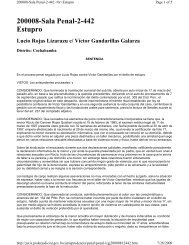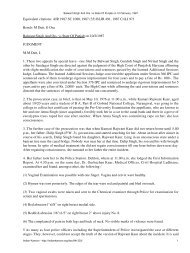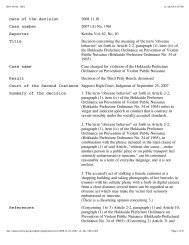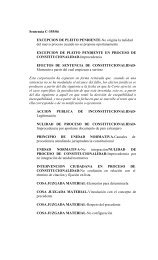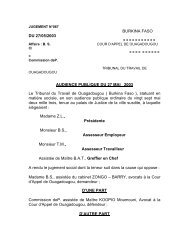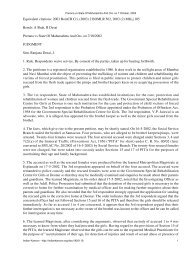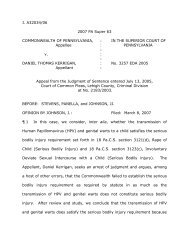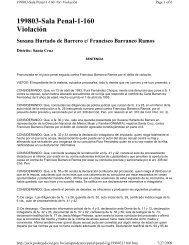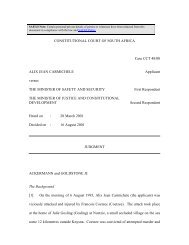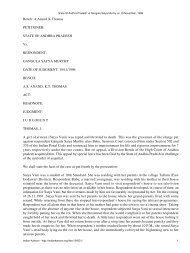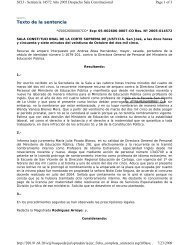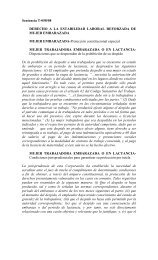commit it acts against public policy.(13) Does commission <strong>of</strong> suicide damage the monopolistic power <strong>of</strong> the State to take life?99. The aforesaid point is not required to be gone into detail, because nobody can claim to have monopolyover a human life. It is God alone who can claim such a power. If a person takes his life, he is taking his ownlife, and not the life <strong>of</strong> anybody else; and so, the argument that State's 41 307 P 2d 175, 181 : 62 N.M. 18342 j 193 p. 885, 887, j 80 Ok 1, 35 : 17 ALR 317 43 58 NE 2nd 947, 950, 951': 115 Ind. App. 289 44 126 SW2d 329, 333 : 174 Tenn 45745 182 NYS 804, 806: III Mis. 244427P.<strong>Rathinam</strong> vs <strong>Union</strong> Of <strong>India</strong> on 26 April, 1994monopolistic power <strong>of</strong> taking life is taken away by the person who attempts to commit suicide has no legs tostand on.(14) Is apprehension <strong>of</strong> "constitutional cannibalism" justified?100. This is one <strong>of</strong> the criticisms which has been advanced in one <strong>of</strong> the aforesaid articles relating to theBombay judgment2. This contention has been advanced because if the negative aspect <strong>of</strong> right to life, i.e., todestroy it can be read in Article 21, the State can "easily embark upon a policy to encourage genocide on theplea that proper management <strong>of</strong> resources are vital and necessary for the upkeep <strong>of</strong> life with vigour anddignity in the wake <strong>of</strong> geometrical progression <strong>of</strong> population growth". The critic has stretched this argumentso much to come to the conclusion <strong>of</strong> "constitutional cannibalism" that we may almost leave it unanswered, asthere is a gulf <strong>of</strong> difference between taking <strong>of</strong> one's own life and allowing the State to go in for genocide.They are not only poles apart but miles apart.101. The Editor <strong>of</strong> Calcutta Weekly Notes in his comments at pp. 37 to 40 [<strong>of</strong> (1986-87) 91 CWN (JournalSection)] has observed that the distinction made by the Bombay High Court between "suicide" and"euthanasia" appears logically inconsistent. According to the Editor, the rationale <strong>of</strong> the judgment wouldnecessarily permit euthanasia as legal. This comment may not be quite incorrect, because in passiveeuthanasia, wherever it has been accepted as legally permissible, consent <strong>of</strong> the patient, if he be in a soundmental condition, has been regarded as one <strong>of</strong> the prerequisites. So, if one could legally commit suicide, hecould also give consent for his being allowed to die. But then, the legal and other questions relatable toeuthanasia are in many ways different from those raised by suicide. One would, therefore, be right in makinga distinction logically and in principle between suicide and euthanasia, though it may be that if suicide is heldto be legal, the persons pleading for legal acceptance <strong>of</strong> passive euthanasia would have a winning point. Forthe cases at hand, we would remain content by saying that the justification for allowing persons to commitsuicide is not required to be played down or cut down because <strong>of</strong> any encouragement to persons pleading forlegalisation <strong>of</strong> mercy-killing.102. May we hasten to observe that as regards the persons aiding and/or abetting suicide, the law can beentirely different, as indeed it is even under the Suicide Act, 1961 <strong>of</strong> England. Bombay judgment2 has rightlymade this distinction. It is for this reason that the apprehension raised by the Andhra Pradesh High Court in itsjudgment in Jagadeeswar3 does not seem to be justified. We do not agree with the view <strong>of</strong> the Andhra PradeshHigh Court in that if Section 309 were to be held bad, it is highly doubtful whether Section 306 could survive,as self-killing is conceptually different from abetting others to kill themselves. They stand on differentfooting, because in one case a person takes his own life, and in the other a third person is abetted to take hislife.<strong>India</strong>n Kanoon - http://indiankanoon.org/doc/542988/ 22
P.<strong>Rathinam</strong> vs <strong>Union</strong> Of <strong>India</strong> on 26 April, 1994428(15)Recommendation <strong>of</strong> the Law Commission <strong>of</strong> <strong>India</strong> and follow-up steps taken, if any.103.The Law Commission <strong>of</strong> <strong>India</strong> in its 42nd Report (1971) recommended repeal <strong>of</strong> Section 309 being <strong>of</strong> theview that this penal provision is "harsh and unjustifiable" (see paragraph 16.33 <strong>of</strong> the Report). In taking thisview, the Law Commission quoted the following observations made by H. Romilly Fedden in Suicide(London, 1938) at page 42: "It seems a monstrous procedure to inflict further suffering on even a singleindividual who has already found life so unbearable, his chances <strong>of</strong> happiness so slender, that he has beenwilling to face pain and death in order to cease living. That those for whom life is altogether bitter should besubjected to further bitterness and degradation seems perverse legislation."104.After the aforesaid Law Commission's Report became available, the recommendation was accepted by theGovernment <strong>of</strong> <strong>India</strong> and the <strong>India</strong>n Penal Code (Amendment) Bill, 1972 was introduced in the Rajya Sabhato repeal Section 309. The Bill was referred to a Joint Committee <strong>of</strong> both the Houses and after receipt <strong>of</strong> itsreport, the Bill was passed with some changes by the Rajya Sabha in November 1978. The Bill so passed waspending in the Sixth Lok Sabha when it was dissolved in 1979, because <strong>of</strong> which the Bill lapsed.105. In the counter-affidavit filed by the <strong>Union</strong> <strong>of</strong> <strong>India</strong> in Writ Petition (Crl.) No. 409 <strong>of</strong> 1986, it has beenfurther stated that a proposal for reintroducing legislation in Parliament on the lines <strong>of</strong> the lapsed Bill is underconsideration. It has been admitted in this affidavit that Section 309 is harsh, and so, the intention <strong>of</strong> theGovernment is more or less to repeal that section. (16)Global view: What is the legal position in other leadingcountries <strong>of</strong> the world regarding the matter at hand? 106.We propose to refer to two leading countries only inthis regard they being United Kingdom and United States <strong>of</strong> America. We have selected them because the firstis a conservative country and the second a radical; the first is first in point <strong>of</strong> time as regards democraticfunctioning and the second is being regarded as a serious human rights' protagonist. At English Common Lawsuicide was taken as felony as much so that a person who had met his end after committing suicide was notallowed Christian burial, but would have to be so done in a public highway. Not only this, the property <strong>of</strong> theperson concerned used to get forfeited to the Crown. [See pages 290 to 207 <strong>of</strong> Law and Morality edited byLouis Bloom Cooper and Gravin Drewry (1976), which pages also contain the speeches made by the LordBishop <strong>of</strong> Carlisle and Lord Denning in the House <strong>of</strong> Lords during second reading <strong>of</strong> The Suicide Bill, 1961.]107.Times changed, notions changed and presently, even attempt to commit suicide is not a criminal <strong>of</strong>fence,as would appear from Suicide Act, 1961. Though Section 1 <strong>of</strong> this Act has only stated that the "rule <strong>of</strong> lawwhereby it is a crime for a person to commit suicide is hereby abrogated", it429has been made clear in the second para <strong>of</strong> 'General Note' below this section, as finding place in the xerox copy<strong>of</strong> this Act enclosed with the written submissions filed on behalf <strong>of</strong> the State <strong>of</strong> Orissa, Respondent 2 in WritPetition (Crl.) No. 419 <strong>of</strong> 1987 that attempted suicide is not a crime. This note reads as below:"Attempted SuicideAn attempt to commit suicide was a common law misdemeanour. Section 1 does not specifically say thatattempted suicide is no longer a crime, but it must follow irresistibly from the fact that the completed act is nolonger a crime......In the United States by early 1970's comparatively small number <strong>of</strong> States (9) listed suicide as a crime,although no penalties (such as mutilation <strong>of</strong> bodies or forfeiture <strong>of</strong> estates) were exacted. In such Statessuicide attempts were either felonies or misdemeanours and could result in ail sentences, although such lawswere selectively or indifferently enforced. Two <strong>of</strong> such States repealed such laws, stating in effect thatalthough suicide is "a grave social wrong", there is no way to punish it. Eighteen States had no laws against<strong>India</strong>n Kanoon - http://indiankanoon.org/doc/542988/ 23



